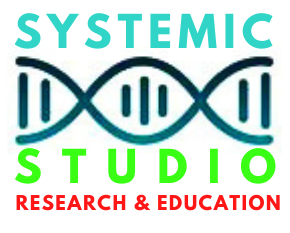Systems, Patterns and Creativity
You are the dream of
your ancestors.
- Dr. Bert Hellinger
***The content shared on this website does not contain any diagnosis or treatment.***
What is Systemic Studio?
Systemic Studio is a publishing company and an educational & research project dedicated to serving the collective. We delve into the implications of systemic family factors on Relationships, Health and Organizations. Our goal is to gain a practical understanding of life and provide scientific analysis and research to demonstrate the vastness of the universal principles that underpin it.
We want to comprehend the essential steps that contribute to individual progress so that we can help people in solving their problems and educate them to achieve a clearer understanding of themselves.
By integrating wisdom traditions, leveraging modern science, and drawing upon personal experiences, we enhance our comprehension of how the system operates.
What do we mean by ''systemic''?
As individuals, we are parts of our family system. When we look beyond ourselves at family energy works and realize that we are connected to our ancestors in a way that we are only beginning to grasp, we begin to see the paths that open before us.
We are members of a system that includes ex-spouses, criminals, victims, lost children and lands, and so on.
If one of the parts of this system is suffering; Often another part of the system also needs attention. You may experience this differently in your life.
“We do not inherit the earth from our ancestors, we borrow it from our children.”
― Native American proverb
What are ''Constellations''?
Systemic Constellations, also known as Family Constellations when applied to family dynamics, are a therapeutic and diagnostic method used to reveal hidden patterns, unresolved traumas, and entanglements in personal, familial, or organizational systems. They are based on the idea that we are deeply influenced by the systems to which we belong—especially our family system—and that issues we face in the present can be traced to disruptions or imbalances in those systems.
Imagine a mobile hanging from the ceiling — like the kind you’d see above a baby’s crib. Each piece on the mobile represents a member of your family or system. When everyone is in their rightful place, the mobile is balanced and moves with grace. But if one piece is missing, too heavy, or tangled, the entire structure tilts — and every other piece compensates unconsciously, shifting out of balance. You might be the little bird at the bottom, swinging wildly — not knowing that the imbalance above you started generations ago. You’re feeling the chaos, but it’s not yours.
Systemic Constellations are like stepping back and seeing the full mobile — gently adjusting each piece until the whole system returns to balance, and you can finally settle.
Core Principles of the Systemic Theory
The System Has a Memory: The family or group system retains the imprint of past events—such as war, exclusion, miscarriages, abuse, or injustice—that can unconsciously affect current generations.
Belonging and Order: Every member of a system has a right to belong and a place. When someone is excluded or forgotten, others may unconsciously “carry” their burden or fate.
Entanglements: Individuals may be "entangled" with past members or events—repeating behaviors, emotions, or fates that are not truly theirs.
The Field: There is a "knowing field" or collective intelligence in the group that reveals the hidden dynamics when representatives stand in for people or elements of the system.
How do constellations work?
A client brings an issue—personal, relational, professional, or existential.
The facilitator asks a few questions, then sets up a constellation using people (in groups) or markers (in one-on-one sessions) to represent family members or system elements.
Representatives report sensations, emotions, or impulses they feel—often revealing unconscious truths.
Through repositioning, dialogue, and ritual, the system is brought toward balance, often producing insight, emotional release, or a shift in the client’s experience.
Picture yourself standing in a dark room. Around you, invisible threads connect you to your parents, grandparents, ancestors, siblings, partners, even colleagues. You tug one thread (say, your difficulty in relationships), and it vibrates all the way back to a forgotten grandmother who lost a child. You didn’t know this consciously — but your system did. In a Systemic Constellation, a facilitator shines a light on this web. Using representatives (people or objects), they reveal what’s normally invisible — the tensions, loyalties, exclusions, or unresolved grief — and allow a healing movement to arise. Not just insight, but a felt shift in the field.
Think of Systemic Constellations like walking into an ancient room full of whispering ancestors. But instead of decoding every story, you listen for what wants to be seen — and in doing so, you free yourself and them.
Why are we focusing on the
subconscious so much?
Understanding the subconscious holds the key to gaining true mastery over our lives. It serves as a repository for all ancestral experiences and personal memories. Surprisingly, a staggering 95% of the thoughts residing within our subconscious are not our own. While we tend to prioritize and attribute great significance to our conscious mind, which governs logical thinking and reasoning, it exerts control over a mere 5% of our existence.*
“No tree, it is said, can grow to heaven unless its roots reach down to hell.”
― C.G. Jung
...this all sounds a bit too abstract and mystical to my analytical mind.
Ok, so the ''The Magic and the Science''...
While it may feel mystical, we describe the process as phenomenological — meaning: “let’s see what shows up when we look without judgment.” It’s not about belief — it’s about direct, felt experience. Some possible scientific frameworks that may explain this phenomenological experience are:
- Epigenetics (how trauma can be passed through generations)
- Mirror neurons & group field effects (how we can feel what others feel)
- Implicit memory and the collective unconscious
How can this help me? What issues can I work on?
Personal growth & healing: Addressing family traumas, inner conflicts, or repeated life patterns as they relate to issues of money, career, health, intimacy, etc
Relationships: Revealing hidden dynamics between partners, parents and children, or ancestors.
Organizations: Diagnosing systemic issues like team dysfunction, leadership struggles, or stagnant growth.
Collective/ancestral trauma: Exploring cultural, racial, or historical burdens.
The Systemic Theory is concerned with ''patterns'. Such as:
Parentification- A child emotionally supports a depressed parent — and grows up exhausted.
Unconscious loyalty- “If my mother suffered in marriage, I will too.”
Inherited grief- A grandchild carries the sadness of a war-displaced grandparent.
Exclusion or injustice- A business fails until it honors someone it mistreated.
Blocked success- A person fears outshining a struggling sibling or parent.
“If you want to find the secrets of the universe, think in terms of energy, frequency and vibration.” ~Nikola Tesla
How was this method developed?
It was developed by Bert Hellinger, a German psychotherapist, in the late 20th century. It draws on family systems therapy, phenomenology, Gestalt therapy, and indigenous wisdom traditions based on Hellinger's 16-year involvement with the Zulu tribe in South Africa while he was a Catholic missionary before becoming a psychotherapist .
I don't know much about my family history.
It's ok. You don’t need to know your full family history — the field often reveals what’s relevant. As much or little as you know is enough.
What else?
Just keep in mind that: Systemic Constellations don’t always “explain” things logically — they reveal felt truths. Don't expect to ''understand'' what's revealed . But you will most likely feel that it resonates with you, even if not right away.
The effects are often subtle but deep: a sense of release, clarity, groundedness, or new movement in life.
I'm curious.
How can I learn more?
Great! You can follow me on social media, subscribe to the newsletter and read the many articles that I share on the blog here, as well as the Resources section below.
If you're interested in becoming a representative at a constellation, I'd be happy to invite you as a first-time guest on one of our regular workshops so that you can get a sense of what it's like to be in ''the field''.
*Here are a few reputable scientific sources that discuss the influence of the subconscious mind on decision-making:
Bargh, J. A., & Morsella, E. (2008). The unconscious mind. Perspectives on Psychological Science, 3(1), 73-79. DOI: 10.1111/j.1745-6916.2008.00064.x
Dijksterhuis, A. (2004). Think different: The merits of unconscious thought in preference development and decision making. Journal of Personality and Social Psychology, 87(5), 586-598. DOI: 10.1037/0022-3514.87.5.586
Kouider, S., de Gardelle, V., Sackur, J., & Dupoux, E. (2010). How rich is consciousness? The partial awareness hypothesis. Trends in Cognitive Sciences, 14(7), 301-307. DOI: 10.1016/j.tics.2010.04.006
Libet, B., Gleason, C. A., Wright, E. W., & Pearl, D. K. (1983). Time of conscious intention to act in relation to onset of cerebral activity (readiness-potential). The unconscious initiation of a freely voluntary act. Brain, 106(3), 623-642. DOI: 10.1093/brain/106.3.623
Van Gaal, S., Lamme, V. A., Fahrenfort, J. J., & Ridderinkhof, K. R. (2011). Unconsciously triggered conflict adaptation. PLoS ONE, 6(1), e17347. DOI: 10.1371/journal.pone.0017347

You are not a drop in the ocean.
You are the entire ocean in a drop. -Rumi
Systemic Constellations
The Knowing Field: International Constellations Journal, edited by Barbara Morgan www.theknowingfield.co.uk
Farewell: Family Constellations with Descendants of Victims and Perpetrators by Bert Hellinger
Love’s Hidden Symmetry: What Makes Love Work in Relationships by Bert Hellinger
In My Mind’s Eye: Family Constellations in Individual Therapy and Counselling by Ursula Franke;
The Tears of the Ancestors: Victims and Perpetrators in the Tribal Soul by Daan van Kampenhout
The Healing Power of the Past: A new Approach to Healing Family Wounds by Bertold Ulsamer
The Presence of the Soul: Transforming Your Life Through Soul Awareness by John L. Payne
The Healing of Individuals, Families & Nations by John L. Payne
I Carry Your Heart in My Heart: Family Constellations in Prison by Dan Booth Cohen; and,
Family Constellations: A Practical Guide to Uncovering the Origins of Family Conflict by Joy Manné.
Health, Happiness, & Family Constellations: How Ancestors, Family Systems, and Hidden Loyalties Shape Your Life – and What YOU Can Do About It by Michael Redding
Trauma & Healing
Psychotherapy
Body, Self, and Soul: Sustaining Integration by Dr. Jack Rosenberg and Dr. Marjorie Rand
The Intimate Couple by Rosenberg and Dr. Beverly Kitaen-Morse
Synchronicity: An Acausal Connecting Principle by C. G. Jung
New Science and Medicine
Pocket Guide to Interpersonal Neurobiology: An Integrative Handbook of the Mind by Daniel J. Siegel
The Body Remembers: The Psychophysiology of Trauma and Trauma Treatment by Babette Rothschild
The Genie in your Genes: Epigenetic Medicine and the New Biology of Intention by Dr. Dawson Church
The Biology of Belief: Unleashing the Power of Consciousness, Matter & Miracles by Dr. Bruce Lipton
Spontaneous Evolution: Our Positive Future (And a Way to Get There From Here) by Dr. Bruce Lipton
Molecules of Emotion: The Science Behind Mind-Body Medicine by Candace B. Pert
Everything You Need to Know to Feel Go(o)d by Candace B. Pert
Morphic Resonance: The Nature of Formative Causation by Rupert Sheldrake
Chaos Creativity and Cosmic Consciousness by Rupert Sheldrake, Terence McKenna, and Ralph Abraham
A New Science of Life by Rupert Sheldrake
Understanding the Human Journey
Deep Truth; Igniting the Memory of Our Origin, History, Destiny, and Fate by Gregg Braden
The Divine Matrix: Bridging Time, Space, Miracles, and Belief by Gregg Braden
The God Code: The Secret of Our Past, the Promise of Our Future by Gregg Braden
Archetypes of the Soul by Varda Hasselmann and Frank Schmolke
Refuse to Choose! A Revolutionary Program for Doing Everything That You Love by Barbara Sher
Beyond the Indigo Children: The New Children and the Coming of the Fifth World P.M.H.
Indigo Adults: Understanding Who You Are and What You Can Become by Kavir Jaffe and Ritama Davidson
The Life You Were Born to Live: A Guide to Finding Your Life Purpose by Dan Millman

